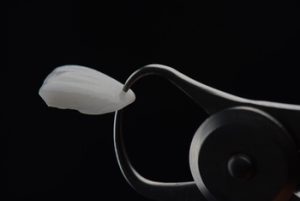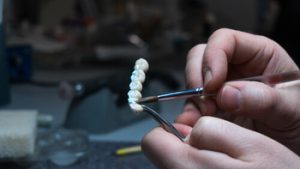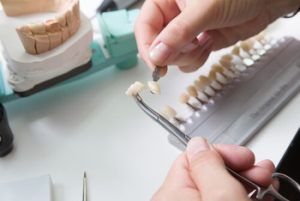Veneers have emerged as a highly sought-after solution for achieving a beautiful smile in cosmetic dentistry. Yet, the question often arises: Are veneers bad for your teeth? This blog aims to address this concern, debunk common myths, and highlight the benefits of dental veneers, ensuring you are well informed about this popular cosmetic dental treatment.
Debunking Myths about Veneers
Navigating the world of cosmetic dentistry can often lead to misconceptions, especially regarding veneers. Let’s debunk some common myths surrounding veneers and reveal the truth about their impact on your smile.
Myth 1: Veneers Ruin Your Natural Teeth
A common misconception is that getting veneers involves extensively grinding down your existing teeth, significantly damaging the natural tooth structure underneath. However, this couldn’t be further from the truth, especially regarding modern cosmetic dental treatments.
Cosmetic dentists employ precise and conservative methods to prepare teeth for veneers. This ensures that the procedure is safe and effectively enhances the appearance of chipped or broken teeth without causing significant damage. Advances in dental technology and materials have further minimised the impact on natural teeth, making veneers a preferred option for those looking to improve their smile while retaining their tooth health.
Myth 2: Veneers Cause Sensitivity and Discomfort
Another myth is that veneers increase sensitivity and discomfort once placed, affecting one’s ability to enjoy hot or cold foods and beverages. While some patients may experience temporary sensitivity following the veneer application, this is usually short-lived and can be managed effectively with proper care and guidance from your cosmetic dentist.
The preparation phase for veneers, which involves removing a thin layer of enamel, can expose the tooth surface, potentially leading to temporary sensitivity.
However, the design of both porcelain and composite veneers aims to mimic the natural protection your enamel provides, thereby reducing sensitivity over time. Additionally, advancements in veneer materials have significantly improved their compatibility with the tooth structure, further minimising discomfort.
Myth 3: Veneers Lead to Tooth Decay and Gum Disease
A concern often voiced is that veneers might contribute to tooth decay or gum disease, assuming their coverage could trap bacteria against the tooth surface.
It’s important to understand that veneers do not cause tooth decay or gum disease. In fact, with proper oral hygiene and regular dental check-ups, the risk of such issues can be significantly lowered.
Veneers are designed to fit snugly against your existing teeth, leaving little to no space for bacteria to lodge and cause decay. Brushing, flossing, and using an antiseptic mouthwash can help prevent gum disease and maintain oral health. Your cosmetic dentist will provide instructions to ensure your veneers and natural teeth remain healthy and strong.
Myth 4: Veneers Damage Is Irreversible
Some believe that once you opt for veneers, the ‘damage’ done to your natural teeth is irreversible, and you’re committed to a lifetime of maintenance and potential complications. This must be clarified for the process and outcomes associated with dental veneers. When applied by a skilled cosmetic dentist, the preparation for porcelain and composite veneers involves only the outermost layer of enamel, which does not compromise the tooth’s ability to function normally.
Should you decide to remove or replace your veneers in the future, options are available. Cosmetic dentistry technology has evolved to offer solutions that maintain the integrity of your natural tooth structure, allowing for adjustments or changes to your veneers with minimal impact.
Myth 5: All Veneers Are the Same
The belief that all veneers are created equal disregards the significant differences between porcelain, composite, and temporary veneers. Porcelain veneers are known for their durability and resistance to staining, often lasting up to 15 years with proper care.
Veneers offer a transformative cosmetic dental treatment for those looking to enhance their smile. They are not the tooth-damaging, uncomfortable, and high-maintenance options that myths might lead you to believe. With advancements in cosmetic dentistry, applying veneers has become safer and more effective, providing a viable solution for addressing chipped or broken teeth, discolouration, and other cosmetic concerns.
Benefits of Veneers
Veneers have emerged as a standout option among cosmetic treatments, offering aesthetic enhancement and functional benefits. They are versatile solutions to various dental issues, from minor cosmetic concerns to more significant structural problems. Below, we explore the multifaceted benefits of veneers, focusing on how they address misaligned teeth, offer an alternative to orthodontic treatment, and strengthen weakened teeth.
Aesthetic Transformation
The primary allure of veneers lies in their ability to transform one’s smile. They effectively address various cosmetic concerns, including discolouration, uneven teeth sizes, and minor gaps. Unlike other cosmetic treatments that may require more invasive procedures or longer treatment times, veneers offer a relatively quick and impactful solution to enhancing the overall appearance of your smile. The customisation aspect ensures that each set of veneers is tailored to match the natural colour and shape of your existing teeth, providing a seamless and natural-looking finish.
Correcting Misaligned Teeth
Veneers present a compelling alternative to traditional orthodontic treatment for individuals with slightly misaligned teeth. While they don’t alter the actual positioning of the teeth as braces do, veneers can cover imperfections to create the appearance of a straighter smile. This option is particularly appealing for adults seeking a faster solution to misalignment issues without the need for braces or aligners. Patients can enjoy the benefits of a corrected smile without the time investment and discomfort associated with orthodontic treatments by choosing veneers.
Strengthening Weakened Teeth
Veneers also offer therapeutic benefits, particularly for teeth weakened by decay, cracks, or extensive dental work. By covering the tooth’s surface, veneers provide additional strength and protection, much like a dental crown, but without significantly altering the tooth’s structure. This protective layer helps prevent further damage and can prolong the life of teeth that might otherwise require more extensive restoration or even extraction. Veneers can save teeth that have lost their natural resilience, restoring functionality and enhancing aesthetic appeal.
Durability and Low Maintenance
Among veneers’ numerous advantages is their durability. With proper care, porcelain veneers can last up to 15 years or more, making them a long-term solution for cosmetic and structural dental concerns. Composite veneers, while not as long-lasting as their porcelain counterparts, still offer significant durability and are a cost-effective alternative. Maintenance of veneers is straightforward, mirroring the care required for natural teeth: regular brushing, flossing, and dental check-ups are all needed to keep veneers in top condition.
Versatility
Veneers stand out among cosmetic treatments for their versatility. They improve the aesthetic appearance of teeth and serve functional purposes by protecting the tooth surface from further damage. This multifunctional approach makes veneers popular for patients looking to address cosmetic and structural issues with a single treatment.
In conclusion, veneers’ benefits extend well beyond their cosmetic appeal. They offer a practical solution for correcting misaligned teeth, provide an alternative to traditional orthodontic treatment, and strengthen weakened teeth, all while being durable and low-maintenance. For individuals considering cosmetic dentistry, veneers represent a versatile, effective option that can address various dental concerns, enhancing their smile’s appearance and functionality.
The Veneer Procedure: What to Expect
Embarking on the journey to a brighter smile with veneers involves a straightforward yet transformative procedure. Here’s what you can anticipate during the veneer application process.
Consultation and Planning
The first step towards getting veneers involves a comprehensive consultation with a cosmetic dentist. This stage is crucial for assessing your oral health and discussing the desired outcome. Temporary veneers may be used at this stage to give you an idea of the final look.
Preparation and Application
During the preparation phase, a small amount of tooth enamel is removed to accommodate the veneer. Then, porcelain or composite veneers are carefully bonded to the tooth, creating a natural-looking, strong bond.
Post-procedure care and Adjustment
Following the application, minimal adjustments might be needed to ensure comfort and fit. Your dentist will also advise on aftercare practices to maintain the veneers’ appearance and longevity.
Caring for Your Veneers: Ensuring Longevity
Maintaining the beauty and health of your veneers is essential for their longevity. Let’s explore simple yet effective practices for keeping your veneers in pristine condition.
Daily Oral Hygiene
Regular Dental Check-Ups
Routine visits to your cosmetic dentist are vital for maintaining your veneers and overall oral health. These check-ups allow for professional cleaning and the early detection of potential issues.
Lifestyle Adjustments
Avoid biting into hard foods and using your teeth as tools to prevent damage to your veneers. These precautions help preserve your veneers’ integrity.
Conclusion
The misconception that veneers are bad for your teeth is largely unfounded. With technological advancements and meticulous application by skilled cosmetic dentists, veneers offer a safe, durable, and aesthetically pleasing solution for various dental issues. Whether it’s porcelain or composite veneers, proper installation, care, and maintenance are key to their success.
Embracing veneers could transform your smile and enhance your confidence and quality of life. The first step is consulting with a professional who can guide you through the process and ensure that veneers are the right choice.
Are you considering veneers to enhance your smile or correct dental imperfections? Contact Casey Dentists at 07 4801 7035 to schedule a consultation. Our team of expert cosmetic dentists will provide personalised advice and options, ensuring your journey towards a beautiful smile is informed, comfortable, and rewarding.
References:
https://www.ncbi.nlm.nih.gov/pmc/articles/PMC6311473/
https://www.medicalnewstoday.com/articles/dental-veneers



